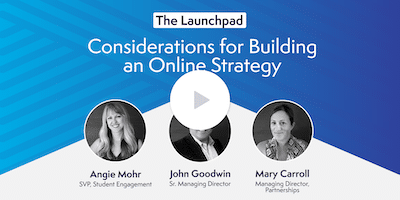How Organic Content Can Support Your Institution’s Marketing Goals
You’ll be able to tell right away that this article wasn’t written by AI. It was written by a person with many years of higher ed content experience. A person who can share insights from that experience, but who doesn’t know everything and is still learning all the time. OK, maybe I’m like AI in that regard.
Welcome! My name is Nici Sandberg, and I’m your non-AI guide to Organic Content 101. It’s my pleasure to walk you through some of the basics of organic content and search, and how you can start building content for your institution of higher ed (IHE).
Let’s get started, shall we?
What Even Is Organic Content?
Good question. Let’s look at the term “organic” first. For our purposes, it has nothing to do with chemistry or vegetables. Organic content is essentially content that occurs naturally without having been paid for by advertising dollars. I guess if we do want to relate it to vegetables, it’s the cream of the crop. Indeed, sometimes the best things in life are free. But not totally free. We’ll get to that later.
Most of us are familiar with Google’s search engine, so let’s start there. When you search for something on Google, Google responds with a variety of links. Some of them are paid ads, and some of them are unpaid (organic) results. Here’s how Google defines organic search results: “A free listing in Google Search that appears because it’s relevant to someone’s search terms.” Does this mean the paid ads aren’t relevant? No, but it’s weird for them to say it that way, eh?
(Fun-ish fact interlude: Those words you type into search engines are called queries because you’re basically looking for the answer to something. You have a question, you ask Google. Thus, search query.)
By creating content or pages on your website that address a specific topic, you’re helping to answer the questions being asked on Google. The better you answer them, and the more interesting, engaging, helpful, and well-researched your content is, the more likely your page will rank higher in organic search results. It’s more or less a meritocracy.
How Does Google Rank Organic Content?
Let’s briefly cover Google’s E-E-A-T guidelines, especially since this sounds like it could lead to another vegetable reference. Google values experience, expertise, authoritativeness, and trustworthiness (E-E-A-T) in content. As an institution of higher learning, you can (somewhat) easily create content that fits these standards. You likely already have a high degree of trust and authority as an IHE. You can tap students and alumni for the experience piece and faculty for expertise. Like a good salad, your content should have a mix of healthy (read: E-E-A-T) ingredients.
Ready to start cooking? We’ll cover more ingredients in the next section.
(Fact break! There are dozens of search engines. Google just happens to be the most popular.)
So… What Kind of Organic Content Can an IHE Marketer Create?
Another great question! You’re such a good student. All those years in college are paying off.
As a higher ed marketer, you have so many content types available to you:
- Faculty profiles
- Trending news topics with faculty (subject matter expert) insight
- Articles related to your programs or areas of expertise
- Campus news and updates
- Recorded webinars and info sessions
- Thought leadership pieces from administrators or faculty
- Alumni spotlights
- Student profiles
Student and alumni profiles are some of my personal favorites. I mean, you have literally THOUSANDS of stories you can tell. Each student has an experience worth sharing. Speaking of sharing, that’s one of the best parts of these types of content. They’re very shareable. Write a student profile, and that student will share it on their own social media pages. You’ll share it on your school’s social channels, too, and your audience will see and reshare it. It’s a great way to generate organic (free-ish) traffic.
Is Organic Content Really Free?
This seems like a good time to talk about the “free” thing, yes? As mentioned earlier, organic listings and search results are there without someone paying money for them to be there. So they’re free in the sense that you don’t pay Google for their placement.
However, organic search success requires an investment. You must spend time and money to build your content. You might have a dedicated writer on your marketing team who can interview students and alumni, for example. You also need to spend time posting content on your website and building a content strategy. So, yes, the placement is free, but you must invest to earn that placement.
Keywords and Beyond!
Many people who focus on search engine optimization (SEO) think keywords are the only path to success in organic content. I can tell you that this is not the case. In my many years of building content for universities, I have found the most success by focusing on the topic. Remember, people are looking for answers to questions in search engine results — and by thoroughly addressing their query, you can rank for many relevant terms.
Let me give you a quick example. During my time as a content director, we wrote and published an article on an industry topic (not a low-funnel piece or one hyperfocused on a degree) that did not take keywords into consideration — we simply covered the topic well, used a skimmable layout (short paragraphs, bulleted lists, subheadings, etc.), and included references. That article ranked for more than 80 keywords. EIGHTY! Without focusing on keywords. Magic? No, just good content.
(Bonus tip: Once you have your content winners [those starting to rise in the rankings], look for other ways to boost them, such as adding a relevant image or video.)
Keywords certainly should have a place in your organic strategy, especially for your core webpages such as your program pages. But they’re not the only factor to consider, nor is it the only type of research to do, for content. Understanding what your audience wants to know and then thoughtfully writing to that in your content will reap measurable benefits.
Best Wishes for Your Organic Content Journey
Quality organic content can increase your organic traffic. And that will support everything else you do. What I’m saying is, quality organic content raises all ships. All marketing channels — paid search, paid social media, organic social media, billboards, email, etc. — work together to boost overall performance when executed correctly, and organic content integrates well with all of your other efforts. And, look, I know I said we weren’t talking vegetables, but if organic content were a vegetable, I think it’d be an onion. It adds flavor to everything else.
Building (and executing) a content plan can help you increase your web traffic, raise your brand awareness, promote thought leadership, and, yes, generate enrollments. We know this can be challenging, so let us know if we at Archer Education can help you on your content journey. We work with dozens of universities, colleges, and higher education institutions doing exactly that. Contact us if you want a little help along the way.
And remember, create content — and eat your veggies!



